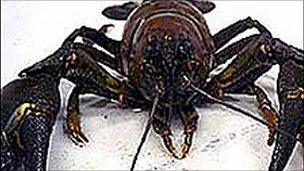NI firm working to tackle signal crayfish threat
- Published

A Donaghadee based company is working to help eradicate the threat caused to native fish by the American signal crayfish.
Electro Fishing Services is developing technology to counter the threat in rivers, lakes and ponds in England, Scotland and Wales.
The American signal crayfish started to be farmed in the UK in the 1970s for sale to restaurants but failed to prove a hit with consumers.
Some escaped and others were released accidentally allowing them to populate hundreds of miles of streams and rivers.
They are not found in waterways in Northern Ireland.
The signal crayfish carry a virus which does not harm them but quickly kills the indigenous white-clawed crayfish.
Robin McKimm, director of Electro Fishing Services said the signal crayfish were harmful to other aquatic life.
"The signals are voracious predators, eating almost anything, starting with all the salmon and trout eggs, then the grass over hanging the river bank," he said.
Eradicating the threat
"With the female carrying more than 250 eggs, the invasive signal crayfish has now reached plague proportions and biologists have been desperately seeking a way of halting its relentless spread."
Mr McKimm explained how he was working to help eradicate the threat.
"We zone the river or stream by putting nets down and remove any other fish by electro fishing, then use extra high power pulses to kill the crayfish.
"This process is repeated in three minute bursts every 30 minutes for at least four days when it is hoped that we will have passed the minimum viability density.
"The river can then returned to its normal state and other fish restored."
Scientists from Queen's University, Belfast are working with the company to collect and analyse scientific data after the signal crayfish have been killed.